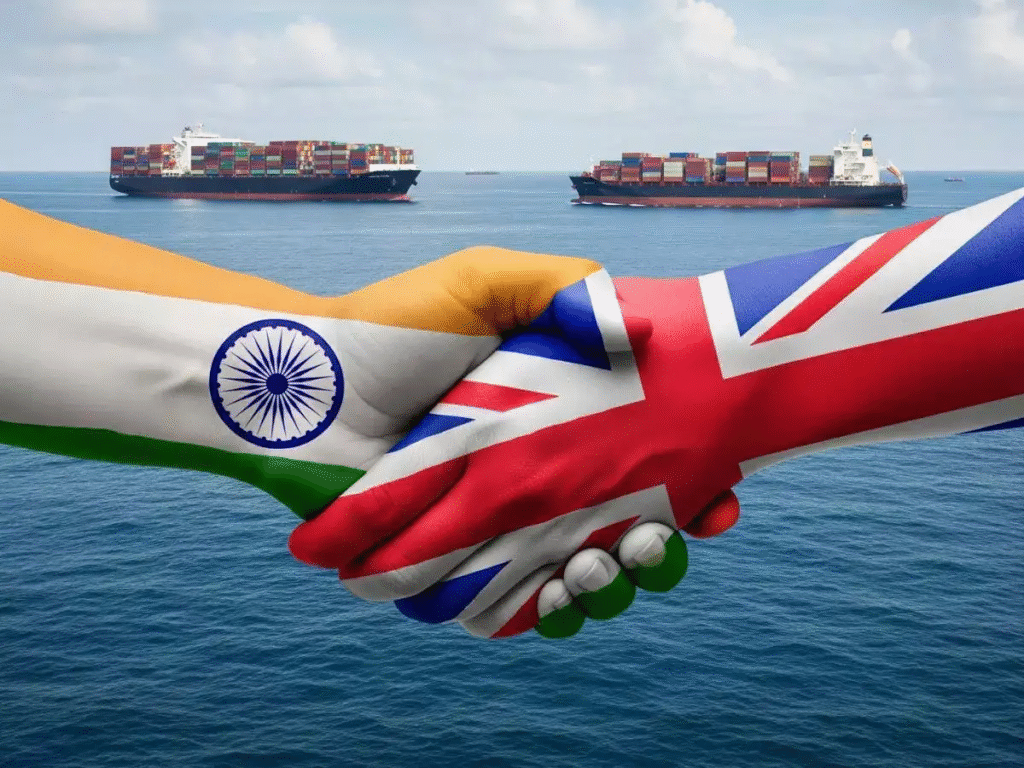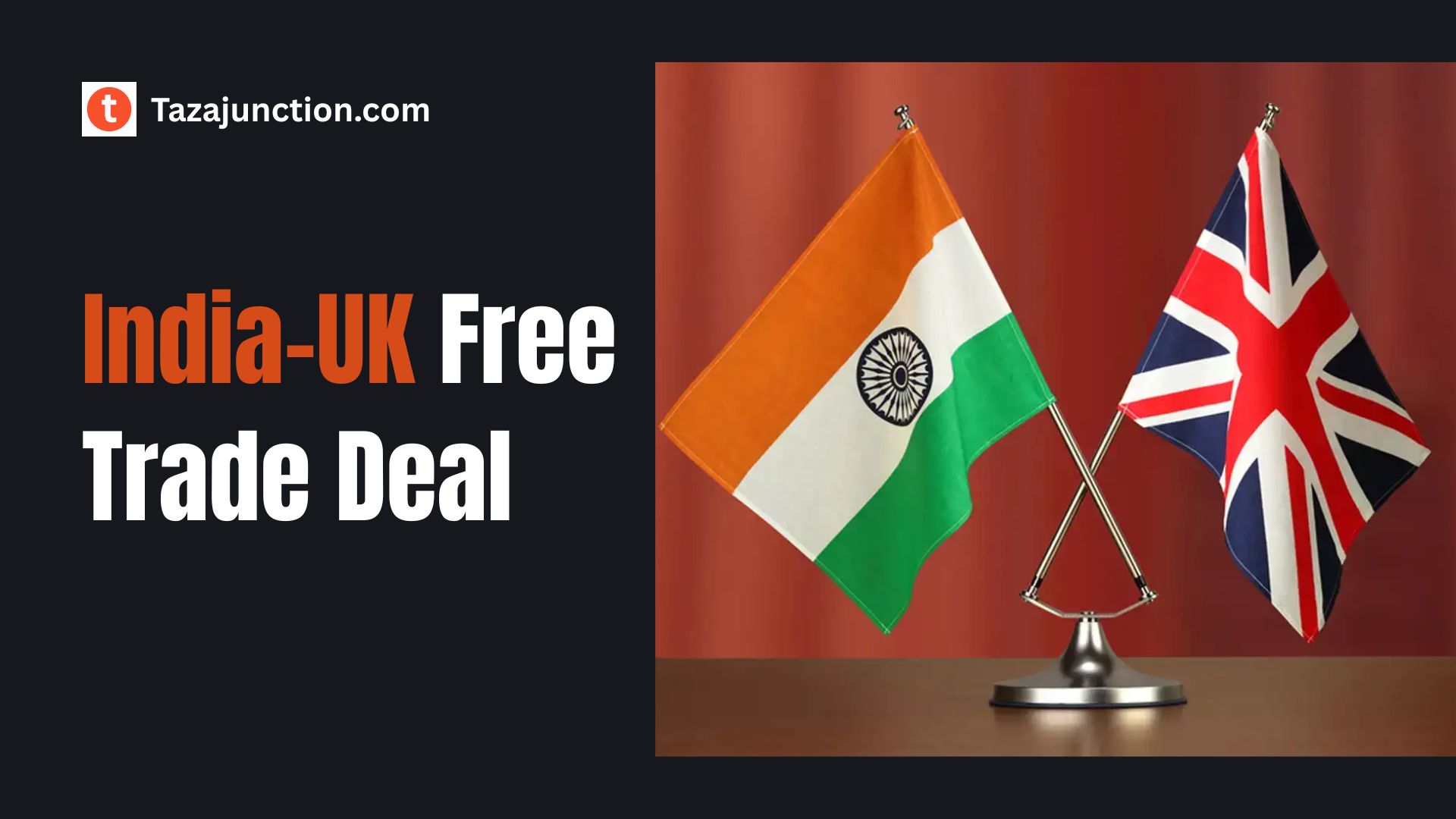In a landmark development, the India-UK Free Trade Deal has been finalized, promising significant economic benefits for both nations.
This comprehensive agreement aims to enhance bilateral trade by reducing tariffs on a wide range of products, including whisky, cars, cosmetics, medical devices, and more.
The deal is expected to foster closer economic ties between the two countries and stimulate growth in various sectors.
Also you want to know about Income Tax return then read our article. This article provides a complete guide on the start date of ITR filing, who needs to file, the due dates, document checklist, common mistakes, and the importance of filing early.
Table of Contents
Key Highlights of the India-UK Free Trade Deal
The India-UK Free Trade Deal encompasses several critical provisions designed to boost trade and investment. Notably, the agreement includes:
- Tariff Reductions: Substantial cuts in import duties on various products, making British goods more affordable for Indian consumers.
- Market Access: Improved access for Indian exporters to the UK market, facilitating the growth of Indian businesses.
- Investment Opportunities: Enhanced opportunities for British companies to invest in India, particularly in sectors like manufacturing and services.
- Regulatory Cooperation: Streamlined regulations to ease trade processes and reduce barriers for businesses operating in both countries.
Impact on Specific Sectors

1. Whisky
One of the most anticipated outcomes of the India-UK Free Trade Deal is the reduction in tariffs on Scotch whisky. Currently, India imposes a 150% import duty on Scotch whisky, making it one of the most expensive markets for this product.
Under the new agreement, this duty is set to decrease to 75% initially, with a further reduction to 40% over the next ten years. This gradual decrease is expected to make Scotch whisky more accessible to Indian consumers and boost sales for British distillers.
2. Cars
The automotive sector stands to benefit significantly from the India-UK Free Trade Deal. Presently, India levies import duties exceeding 100% on foreign-made cars, a barrier that has hindered the entry of many British car manufacturers into the Indian market.
The new agreement introduces a quota system that will reduce these duties to 10% for a specified number of vehicles. This move is anticipated to make British cars more competitively priced in India and encourage greater investment from UK automakers.
Also Ola Electric’s stock market debut in 2024 was one of the most anticipated IPOs in recent memory. You can read more about Ola electric share price gain.
3. Cosmetics
The cosmetics industry is another beneficiary of the India-UK Free Trade Deal. With the reduction of import duties on cosmetic products, British brands will find it easier to enter the Indian market.
This is particularly significant given the growing demand for premium cosmetic products among Indian consumers. The deal is expected to lead to a wider variety of products available in the market and foster healthy competition among brands.
4. Medical Devices
The healthcare sector will also experience positive changes due to the India-UK Free Trade Deal. The reduction in tariffs on medical devices will lower the cost of importing advanced healthcare equipment into India.
This is crucial for improving healthcare infrastructure and providing better medical services to the population. British companies specializing in medical technology are likely to explore new opportunities in the Indian market, contributing to the sector’s growth.
5. Other Sectors
Beyond the aforementioned industries, the India-UK Free Trade Deal covers several other sectors, including:
- Aerospace: Facilitating collaboration between Indian and British aerospace companies.
- Lamb: Reducing tariffs to promote the import of British lamb into India.
- Electrical Machinery: Lowering import duties to encourage trade in electrical equipment.
- Soft Drinks, Chocolate, and Biscuits: Making British confectionery and beverages more affordable for Indian consumers.
These provisions are expected to diversify the range of products available in the Indian market and strengthen economic ties between the two nations.
Economic Implications

The India-UK Free Trade Deal is projected to have substantial economic impacts for both countries. For India, the agreement is expected to lead to an increase in exports to the UK, particularly in sectors like textiles, pharmaceuticals, and information technology services.
The reduction in import duties will also benefit Indian consumers by providing access to a wider variety of goods at lower prices.
For the UK, the deal opens up a significant market for British goods and services. The reduction in tariffs on products like whisky and cars will make these items more competitive in the Indian market.
Additionally, the agreement is anticipated to encourage British companies to invest in India, leveraging the country’s growing consumer base and expanding economy.
Overall, the India-UK Free Trade Deal is seen as a step towards deeper economic integration between the two nations, fostering mutual growth and prosperity.
Strategic and Political Significance
Beyond the economic benefits, the India-UK Free Trade Deal holds strategic and political importance. For India, the agreement represents a move towards greater engagement with Western economies, diversifying its trade partnerships beyond its traditional focus on Asia.
For the UK, the deal is a significant post-Brexit achievement, reinforcing its global trade relationships and opening new avenues for economic cooperation.
The successful negotiation and finalization of the deal underscore the commitment of both countries to strengthening bilateral ties and addressing global economic challenges collaboratively. The agreement is also expected to serve as a model for future trade deals between India and other Western nations.
Implementation and Future Prospects
The India-UK Free Trade Deal is set to be implemented in phases, with immediate reductions in tariffs on certain products and gradual decreases over the next decade for others. Both governments have committed to monitoring the implementation process to ensure that the benefits of the agreement are realized and that any challenges are addressed promptly.
Looking ahead, the deal is expected to pave the way for further collaboration between India and the UK in areas such as technology, education, and climate change. The strengthened economic ties are likely to lead to increased people-to-people exchanges, fostering greater understanding and cooperation between the two nations.
Conclusion
The India-UK Free Trade Deal marks a significant milestone in the economic relationship between India and the United Kingdom.
By reducing tariffs on key products like whisky, cars, cosmetics, and medical devices, the agreement promises to enhance trade, stimulate economic growth, and provide consumers with greater access to a diverse range of goods.
As the deal moves towards implementation, it holds the potential to reshape the economic landscape of both nations and set the stage for a new era of bilateral cooperation.

